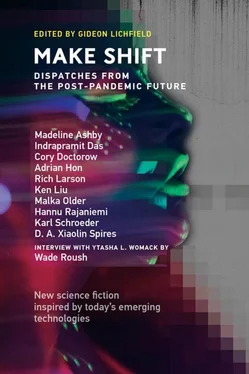“We moved the forest,” he agreed.
“Because you are a giant,” said the girl. The apple in her hands was whittled to its core.
“Are you scared of me?” he asked. After all, the word she used, daitya , could also mean monster. Perhaps that was what the word father meant to her, he thought, with fear in his heart.
She shook her head. He couldn’t tell if there were still tears fresh on her cheeks, because her face was so grubby.
“You don’t mind being a giant’s daughter?” he asked, his body heavy with exhaustion, limbs aching from the work of the day. He hadn’t been this close to another human being in a long time. He had never shared this space inside his mekha with another, ever.
She shook her head again.
His relief was so palpable that he had to wait a moment before he spoke again. He had never wanted a child. But the thought of sending this girl out beyond the safety of his mekha’s body terrified him, an idea that was a corruption of all the mekha stood for, all he stood for in his place inside it, as a servant of god and of the people of this wounded land. He stood, and reclined both their seats. “Sleep now. You need to rest.”
She leaned back without hesitation, still clinging to the apple core. He took it from her fingers, to add to the biofuel compost cache. She was snoring softly in seconds. He shook his head, cursing his single-minded will, the fact that he hadn’t remembered to let her sleep in the side seat earlier in the day. As a mekha, he had a duty to do the work of repair, rescue, and cleanup after the cyclone. But logic evaded his self-judgment. How could he have not let her sleep or eat, after everything she had been through? He found himself once again struck by a fear—that she would dream of her parents, of her real father and mother, if she had ever known them, and wake and remember them. He shook his head to banish this uncharitable unease.
She jerked awake with a gasp. Her little hand found his larger hand. He enclosed it. “Don’t leave!” she said.
“No. This is my body, my mekha. This is my home. You are part of this body now, as am I. I cannot abandon my body. I will not go anywhere, I promise you,” he said. Her breathing slowed, eyelids drifting down as she fell back to sleep. He unfolded the blanket, and covered her entire body with it. He looked around at his mekha’s chest, the neuronal flicker of its internal lights, its cabled nervous system and hydraulic musculature surrounding them. He wondered whether it too felt this new heart inside their chest. Water glittered on the panes between the mekha’s ribs, catching the soft organic light from the alor gach. The city was calm now.
He was a giant.
The girl was small for her age, from the way she talked, her memory of the march. Probably nine or ten. He touched the wall of the mekha in silent thanks, for being the body it was, for saving this child. For making him into a giant, though he had never felt less like one than in that moment. He felt like an open wound, in a way that awakened his senses.
“By god’s grace. A daughter,” he whispered, looking at the sleeping child. “My daughter.”
TO BRISHTI, THE HEART OF THE GIANT BECAME DAITYA, OR BABA.
II
Brishti, in all her smallness, became one of the giants.
She was a spark in their solitude during fresh plagues like this one, when the mekha were among the only ones on the roads of Kolkata, along with the rest of what the inside-people called robotlok , the essential workers who ventured outside in smaller exoskeletons and HEV suits that were second skins rather than second bodies. The chatter of the robotlok was constant. They would take job requests from the barirlok, the insiders, over their comms, and joke with each other in between, to stave off loneliness.
As they roamed the city, Brishti sat in her father’s lap, following the movements of his limbs, the giant’s limbs, the dance of his hands across the instruments, learning how he was both heart and brain to the great body that surrounded them. He often repeated that the mekha was an emanation of god. At other times he would point to the stenciled tattoos all over its body in Bengali, Hindi, Urdu, Japanese, and explain how it was designed by international technology collectives, made in factories here and owned by the government. But to Brishti, it was clear that the mekha was him. He was the life of the giant, and she learned how this was truth.
She learned to use the tiny toilet embedded in the back of the cockpit, which was attached to a biofuel processor, cleaning it in turns so it didn’t stink.
She learned that the mekha had no religion but their own.
She learned how they bathed out in the open, in forest groves, turning on the mekha’s hose and standing under the giant’s open hands. Daitya would always turn around to give her privacy, asking her to hum loudly so he would know she was right behind him as they scrubbed themselves under the cold spray.
She learned how they made the mekha breathe disinfectant, gushing vapor like breath in winter, trailing clouds of it as they walked the city’s valleys.
She learned how they unfurled the mekha’s solar sails when they were low on biofuel or charge, the absorbent membranes iridescent, reminding her of dragonfly wings.
DAITYA SHOWED BRISHTI THE CITY THE GIANTS HAD MADE ANEW.
The streams the giants had dug with their titanic hands out of old roads no longer used, redirecting the anger of the rising Hooghly, filled with fish they could snatch from the waters and eat after roasting them in the palms of the giant, under the flames of their mounted torch.
The hilly ranges that the giants had raised from the flat land of the city, layering fertile earth over the vast mounds of garbage being digested by microbes in Rajarhat and New Town, stepped villages of huts and terraced farms replacing refuse, peaks graced with the floodlights and huge mesh origami of insect farmers’ traps.
The forests the giants had planted along the arteries and spaces of the city, the groves they had pulled forth from grassy field and torn concrete, where wild deer, horses, and goats were bred, hunted, or tamed by the urban villagers who lived in the bans, the woods of the Maidan, Victoria, and St. Paul’s. Self-repairing biocrete huts and garibari clusters huddled around the old Christian cathedral and the memorial palace to the queen whose empire had once ruled this land. Both buildings were now plague hospitals, and places of worship for people of any and all faiths.
IN HUNTING SEASON, DAITYA SHOWED HIS DAUGHTER THAT ALL BODIES HAVE THEIRpotential for violence. In the mekha, in low power mode with all their lights off and engine low, he stalked a cheetal, one of the local deer, through Victoriaban one dusk, when sunset crumbled in gleaming shards through the eaves. When the beautiful creature was in the sights of the giant’s ribs, Brishti’s father raised his hands, and so did the mekha. An invisible volley of hunting darts killed the cheetal instantly.
Daitya regretted this instantly, not because he hadn’t hunted deer before and sold their carcasses to butchers in the Muslim communes of forest villages, but because his daughter burst into inconsolable tears when she realized what had happened to the cheetal.
They carried the cheetal in the giant’s arms to a baner gram, one of the forest villages. There, it was exchanged for leaf-wrapped meals of kebabs and cricket flour roti left in the giant’s mouth. Daitya tried to share the meal with Brishti, but she refused, the meat a reminder of the death they had caused.
In that moment, Daitya remembered clinging to his mother during one of the labor uprisings, so many years before Brishti was born, watching in terror as a giant not unlike the one they sat in sprayed scalding teargas over the crowds, and another swiped a huge hand through them, sending bodies flying like they didn’t matter. They had barely escaped.
Читать дальше












